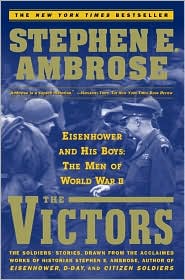 Over the last week I slogged through The Victors, by Stephen E. Ambrose. Slogged is the wrong word, though, because it was actually a good read. Not always easy. Books about war never are. I could write thousands of words about this book. I think we're in danger of forgetting what it used to mean that we lived in America, what it was that differentiated this place from others. I can't see the spirit of World War II in our present conflicts; maybe it's because of our distinctly unenlightened leadership. Whatever it is, reading this book makes clear the difference in time frames; when we went out to fight an evil enemy in WWII, the nation as a whole sacrificed, especially those who went to fight. When we set out to fight the present evil enemy... the nation as a whole was told to go shopping. A sort of review follows the jump.
Over the last week I slogged through The Victors, by Stephen E. Ambrose. Slogged is the wrong word, though, because it was actually a good read. Not always easy. Books about war never are. I could write thousands of words about this book. I think we're in danger of forgetting what it used to mean that we lived in America, what it was that differentiated this place from others. I can't see the spirit of World War II in our present conflicts; maybe it's because of our distinctly unenlightened leadership. Whatever it is, reading this book makes clear the difference in time frames; when we went out to fight an evil enemy in WWII, the nation as a whole sacrificed, especially those who went to fight. When we set out to fight the present evil enemy... the nation as a whole was told to go shopping. A sort of review follows the jump.Maybe I'm just crotchety. I don't care. If we were actually in a fight as big our political leaders say it is, I think we'd be doing more than we are as a country. Anyway, I've gotten off topic. Ambrose was cited late in his life for shoddy research and plagiarism, and the proof is there if you wish to see it. He did skimp sometimes on research, and he did plagiarize (and although he never characterized it as such, most serious researchers would). But he still wrote a pretty readable book, and whatever his deficiencies in research, he is responsible for taking down the oral histories of hundreds, literally hundreds if not thousands, of WWII combat veterans, work that would likely never have been done otherwise. This book is in part the fruit of that particular labor, and whatever concerns may exist about plagiarism and such should be levelled at the man and not at the valuable work of recording history that he did.
Citizen Soldiers, the book from which much of this one is cribbed (his own book this time), would be a better in-depth look at the fighting man of WWII, but this book is a great overview. It is in fact one of the best examinations of life for the soldiers of WWII I've seen, certainly the best I've read. If you haven't read any of Ambrose's other works, and if you can get past the man's faults as a writer, it's a very good read.
1 comment:
I think that's a fair review. Ambrose is not one of my favorite historians, but he's a more capable story-teller than most historians.
And reading any history, even Ambrose history, is better than reading none at all.
Post a Comment